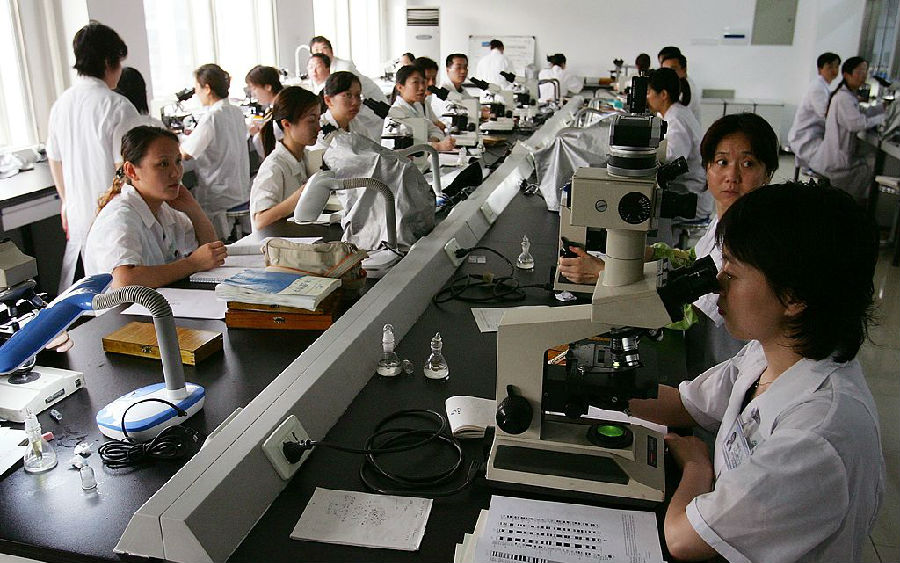(单词翻译:单击)
Chinese patenting applications surged 45 per cent in 2016, according to the World Intellectual Property Organisation, putting the country on track to overtake Japan and the US to become the largest user of the international patent system within two years.
据世界知识产权组织(WIPO)统计,2016年中国专利申请数量激增45%,使其有望在两年内成为国际专利制度的最大用户,超越日本和美国。
ZTE and Huawei, two of China’s largest telecoms and electronics companies, topped the 2016 rankings for corporate patenting compiled by the Geneva-based UN agency.
中兴通讯(ZTE)和华为(Huawei)——中国最大的两家电信电子设备制造商——在总部位于日内瓦的这家联合国机构编制的2016年企业专利申请排行榜上名列榜首。
“China-based filers are behind much of the growth in international patent and trademark filings?.?.?.?as the country continues its journey from ‘Made in China’ to ‘Created in China’,” said Francis Gurry, Wipo director-general.
“中国申请人是国际专利和商标申请很大一部分增长背后的推手……目前中国继续从‘中国制造’转向‘中国创造’,”世界知识产权组织总干事弗朗西斯?高锐(Francis Gurry)表示。
Wipo’s analysis covers international applications through the patent co-operation treaty, which tend to be of higher quality than purely domestic filings. If trends continue, China will move ahead of Japan this year and the US within two years to become the leader in the international patent system.
世界知识产权组织的分析覆盖通过专利合作条约提交的国际申请,这些申请往往比单纯的国内申请具有更高质量。如果当前趋势延续下去,中国将在今年超越日本,在两年内超越美国,成为国际专利制度中的领先者。
Chinese inventors made 43,000 international applications in 2016, while domestic filings make China’s patent office much the busiest in the world, handling more than 1m applications a year.
中国发明家在2016年提交了4.3万件国际申请,同时国内申请使中国专利机构成为世界上遥遥领先的最繁忙专利主管机构,每年受理100多万件申请。
Since Huawei and ZTE started filing international patents in 2000 and 2002 respectively, their applications have risen quickly to take them comfortably to the top two positions in the global patenting table.
自华为和中兴分别在2000年和2002年开始申请国际专利以来,他们的申请数量迅速上升,使他们轻松地在全球专利申请榜单上占据前两位。
“The two Chinese companies are still in a big catch-up race with competitors elsewhere in the world,” said Frank Tietze of Cambridge university’s Centre for Technology Management. “They are filing, filing, filing to build up a big patent portfolio that they can use as a bargaining chip when negotiating with other companies.”
“这两家中国公司仍在与世界其他地方的竞争对手进行一场大规模追赶比赛,”剑桥大学(Cambridge University)技术管理中心(Centre for Technology Management)的弗兰克?蒂策(Frank Tietze)表示。“他们正在申请、申请、申请,以便打造一个庞大专利组合,在与其他公司谈判时用作议价筹码。”
Japan and South Korea have also increased their international patent applications more rapidly than most European and North American companies, though not at the same pace as China. As a result, Asia accounted for 47.4 per cent of all applications last year, just short of the combined share of Europe (25.6 per cent) and North America (25.3 per cent).
日本和韩国也比多数欧洲和北美公司更快地增加了他们的国际专利申请,尽管不像中国那样快。其结果是,去年亚洲占所有申请的47.4%,仅略低于欧洲(25.6%)和北美(25.3%)的份额之和。
“Japanese domestic filings have been declining for eight or nine years while international filings continue to grow strongly,” said Mr Gurry. “There is a clear strategy in Japan to concentrate on patenting and exploiting the best inventions as widely as possible.”
“日本的国内申请已经连续8、9年下降,而国际申请继续强劲增长,”高锐表示。“日本有一套明确的战略,专注于专利申请,并且尽可能广泛地利用最好的发明。”

The US share of global patent activity has been falling since 2000, when it was 34 per cent of the total. Mr Gurry does not expect Donald Trump’s election to affect American intellectual property policy or practice.
美国在全球专利活动中的份额自2000年以来一直在下降;那年它占总量的34%。高锐不认为唐纳德?特朗普(Donald Trump)的当选会影响美国的知识产权政策或实践。
“You might say that President Trump represents the old economy of real estate, manufacturing and energy but the US remains very science and technology oriented,” he said. “I would be surprised to see big changes, even with increasing protectionism.”
“你可能会说特朗普总统代表着房地产、制造业和能源这些旧经济产业,但美国在很大程度上仍是以科学技术为导向的,”他说。“即使有越来越多的保护主义,我也会对大的变化感到意外。”
Among large industrialised countries Canada has experienced the largest declines in patenting in recent years. Wipo linked this to the woes of two of the largest Canadian technology companies, with Nortel in liquidation following bankruptcy in 2009 and Research In Motion / BlackBerry making big cuts in research and development.
在大型工业化国家中,加拿大近年来经历了最大的专利申请下降。世界知识产权组织将其与两家最大的加拿大科技公司的困境联系起来:北电(Nortel)在2009年破产后已被清盘,而黑莓(BlackBerry)背后的Research In Motion大幅削减了研发。


